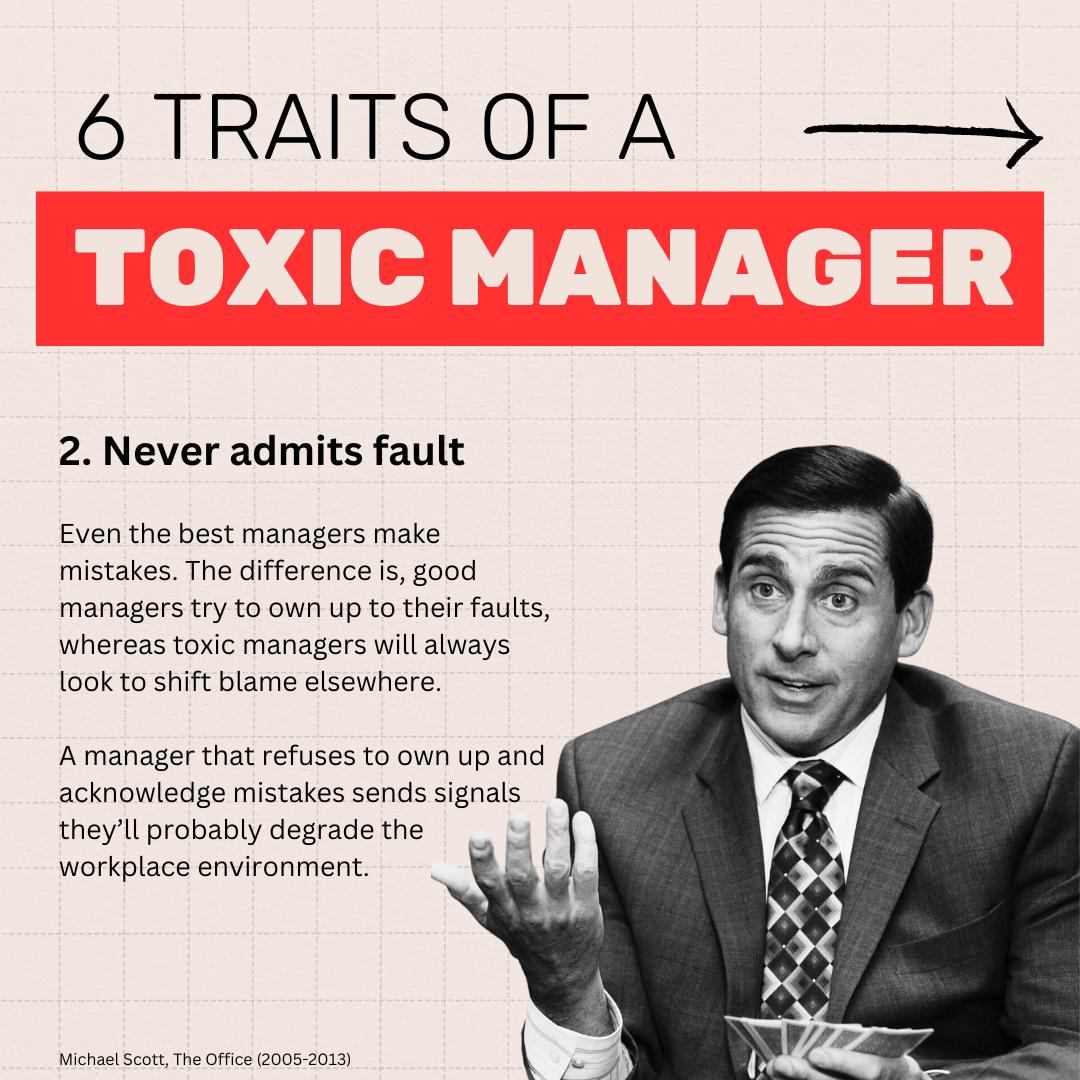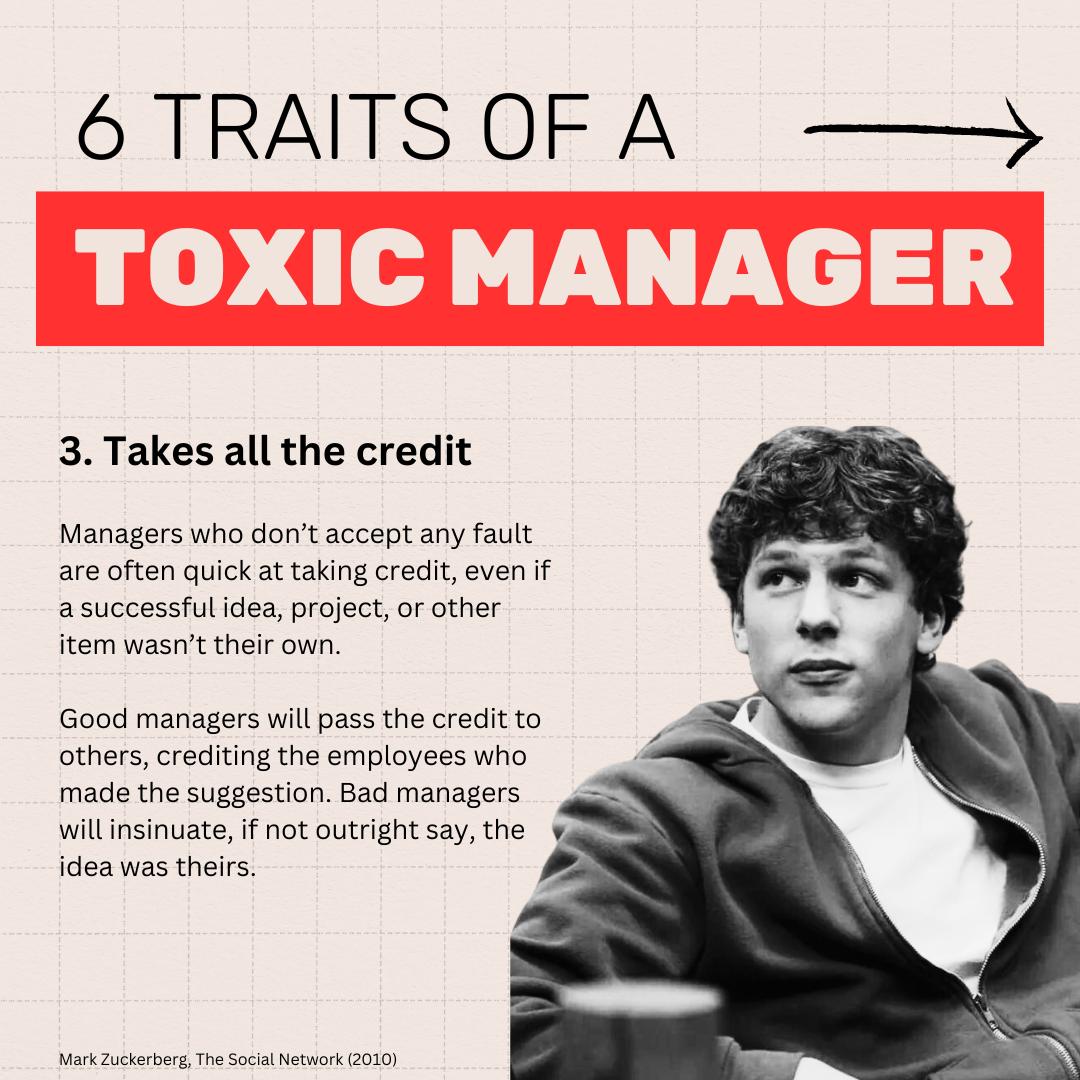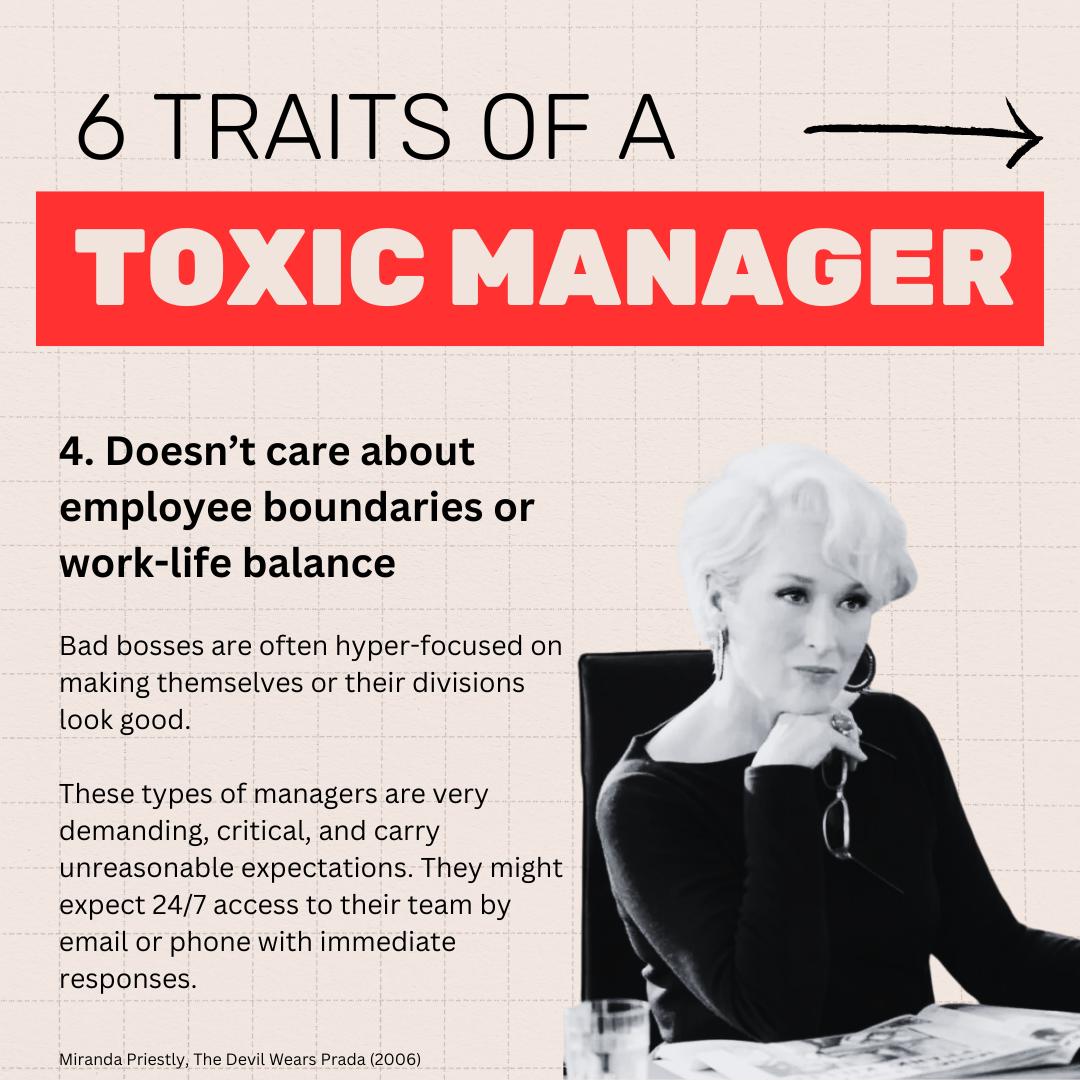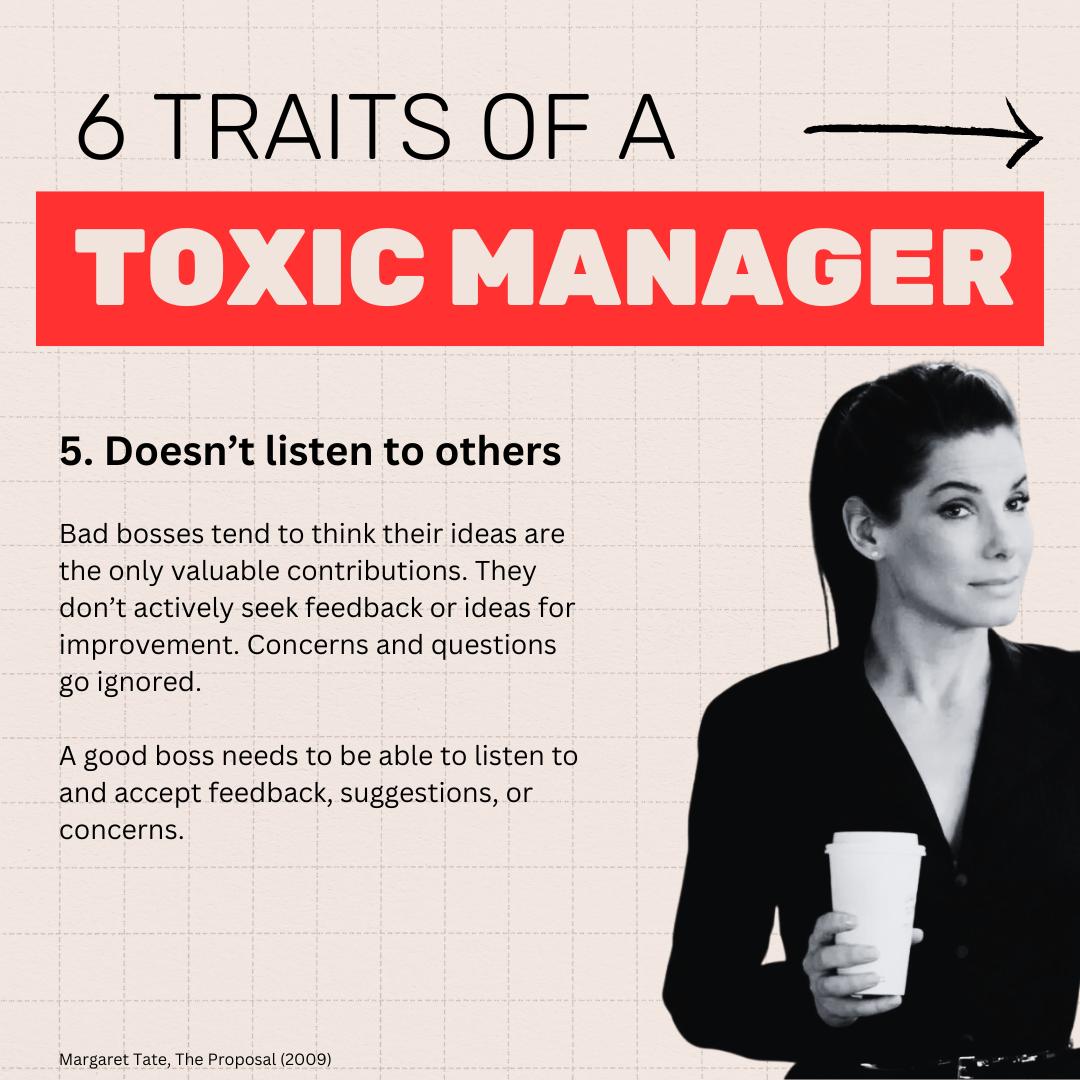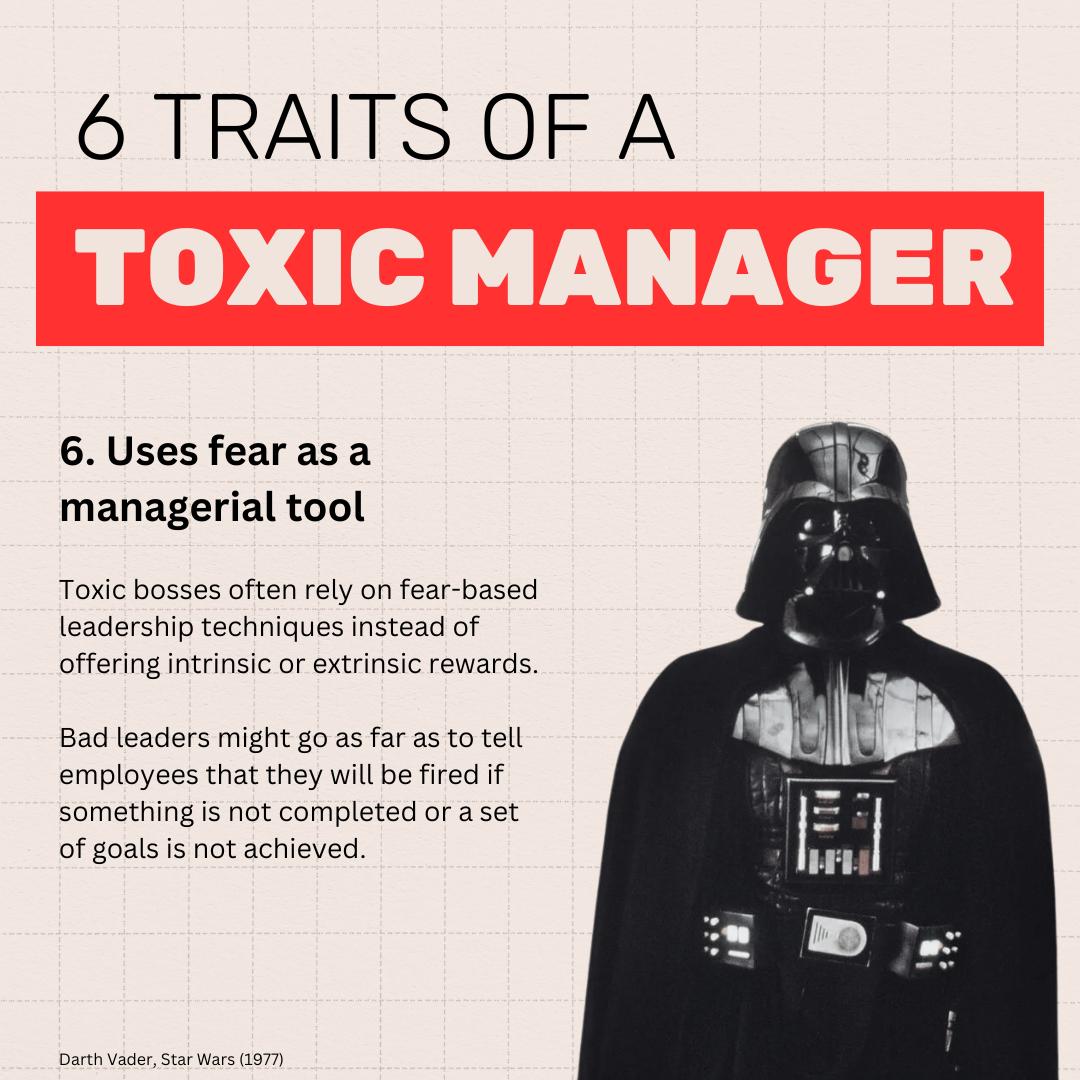12 signs of a toxic manager

One of the primary reasons people often cite why they leave their jobs is due to having a bad boss. Many different factors may constitute why an employee might not like their boss, but in many cases, it’s because they’ve created a toxic work environment.
Table of Contents
According to research by MIT Sloan Management Review, at the start of 2021, over 40% of employees thought about leaving their jobs and later “quit in unprecedented numbers,” leading to what would become known as The Great Resignation. The research found a toxic corporate culture is “10.4 times more powerful than compensation” when looking at a company’s attrition rate within its industry.
Why is this? Here we’ll look at what a toxic manager is and the types of red flags you might see.
What is a toxic manager?
Before outlining the signs of a toxic manager, it’s helpful to define what a truly toxic boss is. A leader is considered toxic if they are ineffective, create unhappiness, stress, and burnout, causing emotional damage to their employees. Some managers cannot complete basic managerial tasks and responsibilities – others thrive on control, belittling people, or abuse of power.
Whatever the reason for the toxicity, it tends to create a miserable workplace environment with lowered productivity and high employee turnover. If you’re an employee struggling with your boss or a managerial decision-maker who thinks they might be dealing with a toxic manager within their midst, look for the following 12 signs of toxicity.
1. Tends to tell lies
As many moms of yesterday used to say, “If you do something wrong and lie about it, that’s often worse than the original offense”. That still holds true today in the workplace and even in professional sports. When a boss lies, they show they aren’t trustworthy, which sets a bad tone for a strong relationship with employees. In some cases, they just can’t help themselves and don’t realize they’re deflecting the truth. Others deliberately lie to avoid being honest. Either way, the result is the same and is a large contributing factor to toxic workplaces.
2. Micromanages their staff
Insecure bosses who don’t trust their team or simply have the need to control everything in their environment tend to micromanage individuals on their teams. This leads to problematic issues while simultaneously harming employee morale, which, unfortunately, can be contagious and spread like wildfire through a work environment. Ultimately, this can lead to high toxic levels in the workplace.
3. The manager never admits fault
Let’s face it, no one is perfect. Even the best managers make mistakes. The difference is, good managers try to own up to faults, whereas toxic managers will always look to shift blame elsewhere. Great leaders don’t just recognize when they make mistakes, they’ll seek feedback by asking employees to let them know if they’re falling short. They actively attempt to get the full scope of a situation by placing trust in others. A manager who refuses to own up and acknowledge mistakes sends signals they’ll probably degrade the workplace environment.
4. Takes all the credit
Managers who don’t accept any fault with their own actions and are slow to find solutions are often typically quick at taking credit, even if an idea, project, or other item wasn’t their own. Good managers will pass the credit to higher-ups, crediting the employee who made a suggestion. Bad managers will insinuate, if not outright say, that the idea was theirs. This can significantly have an adverse impact on the workplace because people are blamed for any innovative ideas that don’t go right – or aren’t recognized for their contributions. Either way, it’s a lose-lose scenario.
5. Plays the blame game but doesn’t express gratitude
Managers who don’t know how to handle problems tend to shift the blame to anything or anyone else they can. Yet, those same bosses will be the last to express gratitude, if they ever do at all. Even if an employee is in the wrong, the toxic manager will reprimand the individual in front of everyone rather than discuss the problem in the privacy of an office. This puts the employee, along with everyone else, in an awkward position. It also generates negativity in the workplace.
6. Doesn’t care about employee boundaries or work-life balance
Bad bosses are often hyper-focused on making themselves or their divisions look good and don’t put stock in the well-being of the people making things happen. These types of managers are often demanding, critical, and carry unreasonable expectations. They might insist employees work long hours (often without compensation). Alternatively, they might expect 24/7 access by email or phone with immediate responses. Over time, this leads to employee resentment and/or burnout, which will never benefit any work environment.
7. Demands high expectations while providing no support
Bosses demanding high performance and unrealistic goals but don’t provide the resources and level of support employees need are displaying a red flag they are probably toxic managers. In contrast, good bosses will establish an open-door policy, invite questions and concerns from employees, and provide the resources team members need to get the job done well. If a boss is handing off a project and saying “Run with it”, while it might initially appear they are promoting autonomy, it could be just the opposite if they aren’t showing signs of support for the work.
8. Pits employees against one another
A boss who doesn’t promote teamwork, instead preferring to pit colleagues against one another, is showing you who they are. While some healthy competition is fine, a manager who constantly has people competing with one another isn’t going to create strong cohesiveness within a team. Over time, the team will probably degrade and this, amongst other contributing factors, will contribute to a toxic work environment.
9. Doesn’t listen
Bad bosses tend to think their ideas are the only valuable contributions. They don’t actively seek feedback or ideas for improvement. Concerns and questions go ignored. Ignoring the people they manage is a strong signal of having toxic tendencies. A good boss needs to be able to listen to and accept feedback, suggestions, or concerns.
10. Uses fear as a managerial tool
Toxic bosses may seem kind on the surface, but when it comes to management techniques, they rely on fear-based leadership techniques instead of offering intrinsic or extrinsic rewards. They tend not to view employees as assets, but as liabilities they must manage to get through each day. It’s a losing way to lead any segment in an organization.
11. Acts differently around their bosses
People who hide their true selves aren’t being honest. When a manager acts differently when their own bosses come into the workplace, this is a glaring red flag. In some ways, it’s worse than other toxic manager tendencies because they know they aren’t acting or performing as they are expected to by their bosses. In fact, they’re hiding it, which means higher-ups may be unaware a problem is brewing.
12. Colleagues feel the same as you
Finally, if you discover other people share the same sentiments as you do when it comes to your manager, chances are you aren’t imagining the toxicity. Occasionally, a boss will show favorites – and those employees don’t realize there is a problem – but when it’s a widespread feeling, it’s a huge red flag.
Toxic managers degrade a workplace
Whether you work for a toxic manager or have employed one, you’re going to feel the negative impact of being around someone who is not positively contributing to the organization. If the toxic manager is left unchecked, chances are the rest of the workplace will experience increased absenteeism, disengagement, and turnover, along with lowered productivity and profitability.
Toxicity tends to often creep into an organization in increments. Often the warning flags go unnoticed – at first. Recognizing the signs is a good first step in identifying the problem and seeking viable solutions.
At the end of the day, organizations must invest in training and in tools that help managers understand how to be better at their job.

